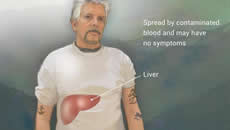Hepatitis C
 | Hepatitis C, also called hep C is an infection caused by a virus that attacks the liver and leads to inflammation. The virus is spread by contact with contaminated blood for example from sharing needles or from unsterile tattoo equipment. |
What is it?
- Sexual transmission is rare but can occur in men who have sex with men (MSM), particularly those with HIV
- Hepatitis C can cause acute Hepatitis (uncommon), chronic Hepatitis C (longer than 6 months, 75%) or spontaneously clear (25%)
- Disease progression is usually slow but may cause cirrhosis, liver failure and hepatocellular carcinoma
- Disease progression can be affected by age at infection, duration of infection, heavy alcohol intake, coinfection with HIV or HBV, male gender, stage of fibrosis and higher ALT levels
- Almost all patients can be successfully treated with DAA (directly acting antiviral) therapy
Signs and Symptoms
- Asymptomatic infection: common
- Acute Hepatitis: uncommon. Symptoms such as lethargy, nausea, fever, anorexia for a few days then jaundice, pale stools and dark urine
- Chronic Hepatitis: infection lasting over 6 months, can be life-long, may cause extra-hepatic manifestations such as skin or joint symptoms
Diagnosis
- You should see your GP if you think you might have hepatitis C. Blood tests can show if you have a current infection
- About 75% will progress to chronic hepatitis
- Past cleared hepatitis C infection does not provide immunity to reinfection
- Medicare Benefits Schedule (MBS) allows 1 HCV RNA qualitative test annually for patients who are Hep C Ab positive or where the results are indeterminate, the patient is immunosuppressed or before seroconversion if necessary for clinical management. A maximum of 4 HCV RNA quantitative RNA tests are allowed on the MBS for patients undertaking treatment.
Treatment
There are some very effective options for the treatment of hepatitis C infection. Newer treatments differ from those available previously:
- They cure around 95% - or more of people who have them (even if they have cirrhosis)
- Their side effects are minimal
- Treatments last just 12 weeks (in most cases)
- They involve just a few pills each day, with no injections required
Curing hepatitis C means clearing the virus from the body. It helps reduce liver inflammation and can also help reverse scarring and cirrhosis. You can be re-treated if your treatment does not work the first time. Check with your GP before taking any other medication or supplements and whether you need vaccinations against hepatitis A and hepatitis B. You should also avoid alcohol if you have hepatitis. If you have liver damage, you may also need to see a liver specialist.
Recommended follow-up
- Patient with chronic hepatitis C should be assessed with other causes of hepatitis for example alcohol or fatty liver and should be counselled to reduce these factors if relevant
- Test of Cure (TOC): Following successful treatment or natural clearance of hepatitis C, HCV RNA will be negative although hepatitis C antibody will still remain positive
- Re-testing: Clearance of hepatitis C does not provide immunity from reinfection. Re-testing is required if there is a continued risk of re-exposure
Contact tracing
- Low risk for sexual exposure (except for HIV positive men) so contact tracing not generally performed for sexual partners
- Contacts via parenteral exposure (shared needles, injecting equipment) should be tested if possible
- Children of mothers who are hepatitis C positive should be tested
For more information
- Health Direct – Hepatitis C
- Australian STI Management Guidelines – Hepatitis C
- Hepatitis Australia
- Contact Tracing: You can now contact trace via SMS, email or send a letter to “Let Them Know” anonymously.